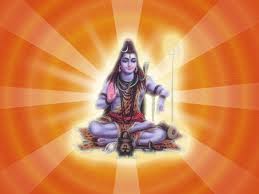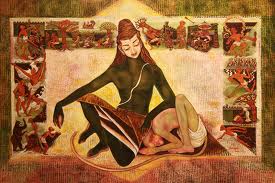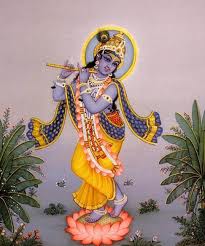Real Freedom from Disease
(Vaastavik Aarogya)
(continued)
For curing disease that comes due to "praarabdh" (deeds performed in an earlier birth), medicines are only instrumental. At the very root, it is only when the consequences of past actions "praarabdh karma" are exhausted, that the disease goes away. If virtuous deeds, penance, mantra etc. is observed, then the disease due to deeds performed in earlier births "prarabdh janya rog" i.e. will go away. But in this the strength and weakness of the past actions has a great influence. In other words, compared to the past actions if the observance (anushthaan) is very strong and dominant , then the disease will come to an end, and comparatively if the deeds performed in an earlier birth are more dominant then the observances, then disease will not go away, in other words, there will be only be a little gain.
Various individuals have taken up the notion that it is not wrong to consume meat, eggs, wine, alcohol etc. if it is taken as a medicine. In reality, these things will lead to great downfall. Only those individuals believe in such things, who only want to keep their body well, and whose aim is pleasure, rest-relaxation of the body, and who are not concerned about righteousness (dharma) or about what is for their eternal good (kalyaan), their salvation. It is not a rule that by consuming impure things, the body will become healthy. On the contrary, new diseases will arise. The disease from the diseased animals also comes to those who eat their meat. You will have to undergo the punishment for the sins that will be incurred from consuming impure things. Therefore impure things should not be eaten even in the form of medicines. He who has no disease in the body, whose aims is his own eternal good (kalyaan), why must he incur sins by consuming impure things for the perishable body?
Besides the following two - food and water man should have need of no other thing. One has to take food and water to remain alive, but if a man does not take tea, coffee, cigarettes, "bidi", chewing tobacco, betel-leaf and arica nut, tobacco, opium, hukka-pipe, etc. he is not going to die. By taking these things, his habit is spoiled, time is wasted, money is wasted and the body is wasted away. Addictions to bad habits once formed are very difficult to get rid off, and man becomes dependent on them. A dependent man cannot be happy even in his dreams - "Paradheen sapanehun sukhu naahin" (Manas, Bal. 102/3)
In a verse in the Gita, God first pointed out the outcome of foods endowed with quality of "sattva" (purity) and later described the things to be eaten. From this it is proven that a man of purity first thinks about the consequences, before he eats the food. However, the man endowed with qualities of "rajas" (passion or activity), his eye goes towards the food, not toward the consequences of eating that food. Therefore God first talks about the foods that cause passion and activity and later talks about the consequences of eating such foods "dukhshokaamayapradaah" . If man thinks about the consequences of eating certain foods from the beginning, then he would hesitate to eat foods that cause passion and activity because in the end man does not want to suffer, or regret or become sick. However due to infatuation and attachment to food, the intellect of a passionate (rajas) man does not go towards the outcome at all. A man endowed with "tamas" (inertia), with an ignorant disposition is deluded; eating out of attachment he never looks towards the consequences. Therefore God has not shared the outcome of foods that cause inertia and delusion (tamas). Whether food is imparted fairly and justly or not, whether I am entitlement to it or not, whether it is in accordance to the commands of the scriptures or not, whether its outcome is good or not - not thinking about any of these things, a deluded man, like an animal becomes inclined towards it and is pre-occupied in eating it. (to be continued)
From book in Hindi "Sant Samagam" by Swami Ramsukhdasji
Ram Ram
To read previous postings on "Real Freedom from Disease" -
Part 1 - http://groups.yahoo.com/group/sadhaka/message/3347
Part 2 - http://groups.yahoo.com/group/sadhaka/message/3348
*********************************************************
If in doubt regarding the translation, please read the original Hindi message by Swamiji.
FOR MESSAGE IN HINDI PLEASE VISIT Date : 23rd May, 2012 "Vaastavik Aarogya"
http://www.satcharcha.blogspot.in
****************************************
Various individuals have taken up the notion that it is not wrong to consume meat, eggs, wine, alcohol etc. if it is taken as a medicine. In reality, these things will lead to great downfall. Only those individuals believe in such things, who only want to keep their body well, and whose aim is pleasure, rest-relaxation of the body, and who are not concerned about righteousness (dharma) or about what is for their eternal good (kalyaan), their salvation. It is not a rule that by consuming impure things, the body will become healthy. On the contrary, new diseases will arise. The disease from the diseased animals also comes to those who eat their meat. You will have to undergo the punishment for the sins that will be incurred from consuming impure things. Therefore impure things should not be eaten even in the form of medicines. He who has no disease in the body, whose aims is his own eternal good (kalyaan), why must he incur sins by consuming impure things for the perishable body?
Besides the following two - food and water man should have need of no other thing. One has to take food and water to remain alive, but if a man does not take tea, coffee, cigarettes, "bidi", chewing tobacco, betel-leaf and arica nut, tobacco, opium, hukka-pipe, etc. he is not going to die. By taking these things, his habit is spoiled, time is wasted, money is wasted and the body is wasted away. Addictions to bad habits once formed are very difficult to get rid off, and man becomes dependent on them. A dependent man cannot be happy even in his dreams - "Paradheen sapanehun sukhu naahin" (Manas, Bal. 102/3)
In a verse in the Gita, God first pointed out the outcome of foods endowed with quality of "sattva" (purity) and later described the things to be eaten. From this it is proven that a man of purity first thinks about the consequences, before he eats the food. However, the man endowed with qualities of "rajas" (passion or activity), his eye goes towards the food, not toward the consequences of eating that food. Therefore God first talks about the foods that cause passion and activity and later talks about the consequences of eating such foods "dukhshokaamayapradaah" . If man thinks about the consequences of eating certain foods from the beginning, then he would hesitate to eat foods that cause passion and activity because in the end man does not want to suffer, or regret or become sick. However due to infatuation and attachment to food, the intellect of a passionate (rajas) man does not go towards the outcome at all. A man endowed with "tamas" (inertia), with an ignorant disposition is deluded; eating out of attachment he never looks towards the consequences. Therefore God has not shared the outcome of foods that cause inertia and delusion (tamas). Whether food is imparted fairly and justly or not, whether I am entitlement to it or not, whether it is in accordance to the commands of the scriptures or not, whether its outcome is good or not - not thinking about any of these things, a deluded man, like an animal becomes inclined towards it and is pre-occupied in eating it. (to be continued)
From book in Hindi "Sant Samagam" by Swami Ramsukhdasji
Ram Ram
To read previous postings on "Real Freedom from Disease" -
Part 1 - http://groups.yahoo.com/group/sadhaka/message/3347
Part 2 - http://groups.yahoo.com/group/sadhaka/message/3348
*********************************************************
If in doubt regarding the translation, please read the original Hindi message by Swamiji.
FOR MESSAGE IN HINDI PLEASE VISIT Date : 23rd May, 2012 "Vaastavik Aarogya"
http://www.satcharcha.blogspot.in
****************************************







